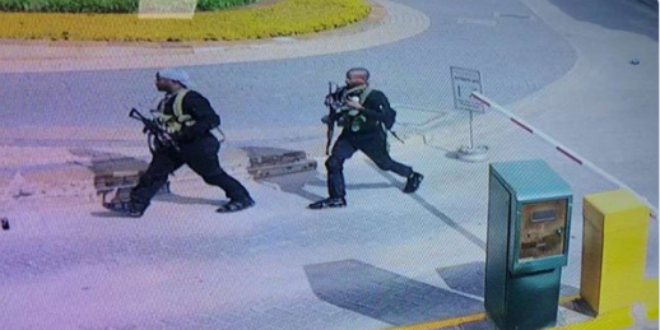Twin terrorist attacks – one in the Kenyan capital, Nairobi, and the other in northern Syria showed that despite counter claims, Islamist terrorism is alive and well.
U.S. President Donald Trump precipitously announced the withdrawal of U.S. troops from Syria, claiming that ISIS was on the back foot and would soon be neutralized as a force. Then came Wednesday’s attack in Manbij.
According to a report on Debkafile, “The military council of Mabij said in a statement on Thursday that more than 20 civilians were killed, as well as four Americans, in a big explosion in the center of the north Syrian town on Wednesday, and that a cell of 7 terrorists, ‘acting in concert with Turkish intelligence’ had been arrested. A large number of weapons and ammunition, including grenades, Kalashnikov assault rifles and M6 rifles was seized during searches. The blast was detonated by a suicide bomber on the town’s high street as a US military patrol was passing by. The attack was initially claimed by Daesh [Islamic State].” Three U.S. servicemen were also reportedly wounded in the attack.
Manbij, located in the northeast of Aleppo Governorate in northern Syria and only a few miles from the Turkish border, was liberated from ISIS in 2016 by the Syrian Democratic Forces (SDF). However, there is controversy connected with the SDF; although they are partners in the anti-ISIS Coalition, Turkey views them as linked to Kurdish People’s Protection (KPP) units – which it views as a terrorist organization. This had been one of the causes of the tension in US-Turkey relations over the last few months, culminating in Trump’s decision.
More than 5,000 miles away from Syria, another Islamist group carried out a prolonged terrorist attack in Kenya’s capital, Nairobi. Beginning on Tuesday and continuing into Wednesday, heavily armed terrorists took over the DusitD2 Hotel, in the same Westlands suburb that witnessed a similar attack at a mall in 2013. In that massacre, an 80-hour siege resulted in 67 people being killed. Initial reports suggested that approximately 700 people were evacuated from the hotel complex and that the death-toll in this latest atrocity was 24, though this may be subject to change.
One of the most poignant victims of the attack was American tech CEO Jason Spindler. He survived the September 11 World Trade Center immolation, but was caught up in this latest barbarity.
CCTV footage reveals faces of militants behind #RiversideAttack. #KenyaAttack #WeShallOvercome pic.twitter.com/ouYugp5s9v
— Nairobi News (@Nairobi_News) January 16, 2019
What made this attack especially newsworthy is not that it was carried out by Somali-based Islamist group Al-Shabaab – who also carried out the attack at the Westgate Mall and in 2015, Kenya’s deadliest ever assault when they shot dead almost 150 people at Garissa University – but they directly linked the motivation for carrying it out as a response to Trump’s moving the U.S. Embassy from Tel Aviv to Jerusalem.
“The Mujahideen carried out this operation … [as] a response to the witless remarks of U.S. President Donald Trump, and his declaration of Al-Quds [Jerusalem] as the capital of Israel,” the statement read.
UPDATE: #AlShabaab spokesman Sheikh Ali Dhere says Nairobi attack was retaliation for #US Pres. Donald Trump’s decision to recognise Jerusalem as the capital of #Israel, 21 people were killed in this attack according to #Kenya police chief, while Al Shabab claims killing 47 pple. pic.twitter.com/f6OeHHsJIi
— Mogadishu Update (@Magdashi3) January 17, 2019
On Wednesday, Kenyan President Uhuru Kenyatta said that the five attackers had been “eliminated.”
Source: Israel in the News

